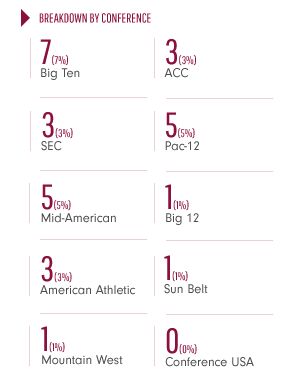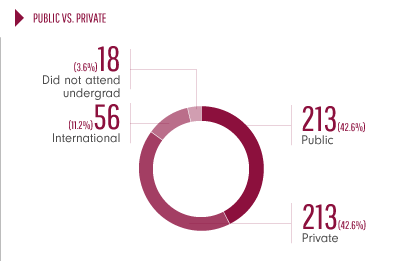
The University of Wisconsin currently has the most alums as Fortune 500 CEOs. Photo by Jeff Miller/UW-Madison
The number one undergraduate college that produces the most Fortune 500 CEOs? University of Wisconsin.
A new study by Kittleman, a source for nonprofit leaders, examined all 500 CEOs of Fortune 500 companies to see where each earned their undergraduate degree. You might think most CEOs come from Ivy League universities, but the study by Kittleman proves that to be wrong. In some ways. The University of Wisconsin came out on top with 14 CEOs currently at Fortune 500 companies. Following in second was Harvard University with 12 CEOs. Among the top 10, only two schools are Ivy League universities: Harvard (at second) and Cornell (at third).
Kittleman’s study focused exclusively on undergraduate schools that Fortune 500 CEOs attended. After calculating results, Kittleman then broke down the numbers into categories such as public vs. private and conference. Similarly, they also used the same methodology to determine non-profit CEOs and leaders.

Kittleman image
BROKEN DOWN BY CONFERENCE AND PRIVATE VS. PUBLIC
Among the conferences, the Big Ten produces the most Fortune 500 CEOs, with 62 or 12.4% of the 500. Coming in second is the ACC, which produced 28 CEOs, or 5.6% of the 500. In third is the SEC with 26 CEOS (5.2%), with the Pac-12 following, producing 24 CEOs (4.8%).
Kittleman’s research finds that it probably doesn’t matter much whether or not you attend a private or public undergraduate university. Among the top 30 schools, there is an even split of CEOs between private and public schools. At a closer look, it’s also important to note that 3.6% of Fortune 500 CEOs did not attend undergrad and another 11.2% attended international universities.
NON-PROFIT RESULTS
Which schools produce the most nonprofit leaders?
Yale came out on top with four nonprofit leaders. Following closely were Georgetown, Princeton, State University of New York, University of Wisconsin, and UC-Berkeley.
Taking a closer look at schools that produced nonprofit leaders, it’s important to note that a majority of nonprofit leaders actually attended private schools. Only nine top nonprofit leaders didn’t attend any university and four attended international schools.
EDUCATION GETS YOU PLACES — MOSTLY

Kittleman image
Academic credentials are certainly an important factor in moving up the career ladder and even to move up socioeconomic levels. According to the Harvard Business Review, nearly a third of jobs that once required only a high school diploma, now require a four-year college degree. What’s more, 25% of jobs that required a bachelor’s degree now require a master’s.
Yet, the Harvard Business Review’s CEO Genome Project, which examined more than 17,000 C-suite executive assessments, found that 8% of CEOs did not complete college at all. According to the Harvard Business Review, that 8% of CEOs overcame the odds in three ways: becoming a proven insider, over indexing on results, and being a talent magnet.
Becoming a proven insider starts by gaining deep industry-specific and firm-specific knowledge. Despite having not attended college, 89% of CEOs without college degrees “grew up” in the same industry where they served as CEO.
“Employers often feel safer hiring industry and company insiders,” according to the Harvard Business Review. “These CEOs’ deep knowledge and relationships gave them a platform for success that more than compensated for lack of formal education.”
Moreover, without a college degree, these CEOs needed to let their results speak for themselves.
“As we shared in What Sets Successful CEOs Apart, reliability is one of four CEO Genome behaviors that differentiates successful CEOs — and the only one that also doubles your chances of getting hired into the role,” the Harvard Business Review reports.
Interestingly enough, CEO’s without a college degree also had roughly twice the rate of military experience than the overall CEO pool that was analyzed.
“In the absence of a college degree, military experience can offer opportunities to learn important skills and demonstrate results in early leadership experiences,” the Harvard Business Review reports.
Surrounding yourself around talented individuals can also help if you aren’t attending college.
“The CEOs without degrees that we analyzed were more likely than their peers to proactively surround themselves with strong talent and lean on the team to contribute expertise,” according to the Harvard Business Review. “They were humble, and more open to soliciting ideas from all types of people, regardless of status or rank.”
It’s important to note that these 8% of CEOs are exceptions. But the Harvard Business Review study highlights an interesting point: Knowing your field, delivering results, and learning from others are perhaps just as important as that expensive college degree.
“Each of us faces our own formidable hurdles on the way to the top. While the CEOs we studied surmounted the extra obstacle of not having gone to college, we think their career paths can provide lessons to other leaders regardless of their level of education. We will all do a better job if we learn our business deeply, focus on delivering results, and learn to lean on others.”
(See the following page for the full list of schools with CEOs at Fortune 500 companies and nonprofits.)











Questions about this article? Email us or leave a comment below.